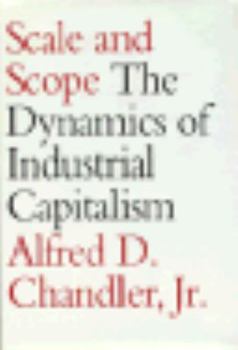Scale and Scope: The Dynamics of Industrial Capitalism,
Select Format
Select Condition 
Book Overview
Cet ouvrage est le premier specifiquement consacre a l hidradenite suppuree, affection frequente mais meconnue. Ecrit par des experts internationaux specifiquement interesses a l hidradenite suppuree, cet excellent travail offre une vision complete du sujet et apporte les bases d une comprehension approfondie de la maladie.
Format:Hardcover
Language:English
ISBN:0674789946
ISBN13:9780674789944
Release Date:April 1990
Publisher:Belknap Press
Length:860 Pages
Weight:2.74 lbs.
Dimensions:1.7" x 6.5" x 9.6"
Customer Reviews
1 rating
Scale and Scope: The Dynamics of Industrial Capitalism
Published by Thriftbooks.com User , 17 years ago
Based on an examination of 600 companies in Britain, Germany, and the United States, this economic history explains the emergence and development of large industrial enterprises from the late 19th century until World War II. The book also shows how differences in geography, demographics, and institutions influenced the development of industrial enterprises in these three countries. Author Alfred Chandler, who won a Pulitzer prize for a previous book in this field, argues that large-scale industrial enterprises were an organizational response to newly integrated national markets and new technologies for production and distribution. Railroads and national telegraph networks brought nations together and created large-scale markets, the first prerequisite for these large companies. Railroads also made important organizational innovations, as the first companies to employ upper, middle, and lower management, and the first to separate headquarters offices from specialized departments. In the United States, the railroads' immense capital requirements also led to the rise of New York as the second finance center after London. The second prerequisite for development of large industrial enterprises was new technology. In contrast to older, more labor-intensive industries, where growth occurred by scaling up existing processes, giant industrial companies arose by radically increasing the capital employed, improving production processes, integrating production processes within a single plant, or making better use of energy. Giant companies developed in new industries like petroleum, chemicals, sugar, vegetable and animal oils, metals, food and tobacco, and machinery. By investing massively in production, managerial, and distributional capabilities, these companies were able to achieve minimum efficient scale: that is, the level of production for a given state of technology that produces the lowest average unit cost. Since minimum efficient scale was large with respect to the total size of the market, the first companies to achieve minimum efficient scale acquired tremendous competitive advantages and made tremendous profits, while later entrants had to take business away from established companies to survive. After achieving minimum efficient scale, many companies began to integrate upstream to ensure reliable sources of supply. Companies integrated downstream most often to use their superior knowledge of their products to market them more effectively. These organizational capabilities could then be leveraged to enter new geographical markets or new lines of business. Chandler identifies this drive to capture new markets through investments in production, managerial, and distributional capabilities as the key dynamic of large industrial companies. Rather than entering into price competition that would inevitably lead to the disappearance of profits, competition occurred mainly through strategic decisions (entering markets with more profit po






